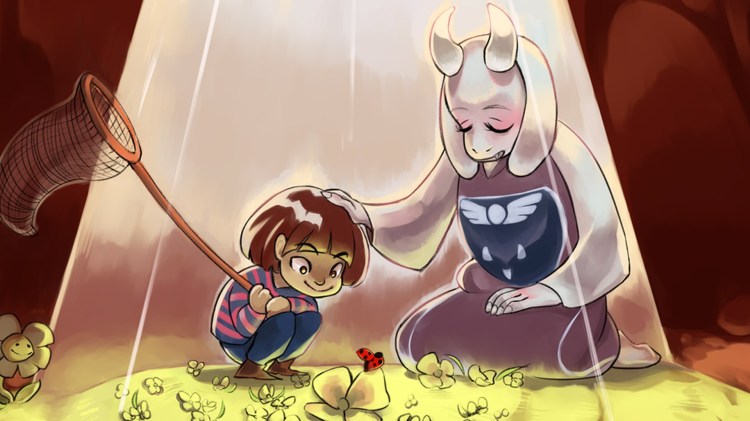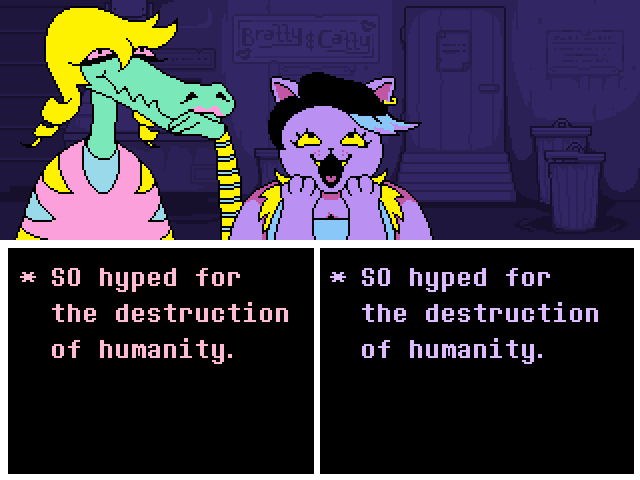In life, you live with the consequences of your actions. Sometimes games are like this, too, but it’s hard to care as much about pretend consequences. After all, it’s just a game, right? You can do what you want. You can see everything there is to see in a game, morally questionable or no. Why is that?
It’s partially the fault of feedback designed into the game to manipulate the player into doing certain things. Games live and die based on the feedback they give — and don’t give — the player. If you want someone to feel like they’re doing well, you reward them somehow. As certain types of feedback became codified in certain types of games, genre conventions were born, establishing a baseline for how these games are designed. Japanese role-playing games, for instance, use a feedback loop that treat battles as a stepping stone towards progress. Defeating enemies gain you experience, which increases your level and makes you more powerful, paving the way to let you get further in the game and survive in more difficult areas. Though strategy is involved in the battles themselves, pure numbers are often prioritized, leading to the practice of level grinding to be able to progress.
We as players sometimes become so drunk on these conventions that we begin to buy into the video game logic this leads to — killing as a central catch-all mechanic, for one — and crave that feedback that tells us we’re doing a good job, we’re doing the right thing in video game land. Undertale, the newest PC game from independent creator Toby Fox, forces us to question this cycle, to really think about why we do the things we do in games by utilizing a mix of humor, regret, and relationships to form one of the most important game releases of 2015.
What you’ll like
A truly fresh battle system
You play as a child who fell into a realm of monsters sealed away from the human world, and your goal is to find your way out. Much like the aforementioned JRPG feedback cycle, you fight in random encounters against monsters using weapons you find or buy along the way. Killing them nets you experience and will eventually increase your level, which in turn makes killing monsters easier and you more resilient. Though it features a timing-based hit system similar to Shadow Hearts or Legend of Dragoon, playing Undertale in this way makes it functionally identical to almost every other JRPG on the market, albeit a modest-looking, well-crafted one.
The amazing parts of fights, though, is actually what happens when the enemy attacks you. Instead of the usual sequence where an enemy makes and attack and either hits or misses you, you actually have to physically dodge attacks. The battle screen resembles the NES Dragon Quest games, with a minimalist black background and a first-person view of a flat plane. But here, enemy attacks are actually short action sequences. A box pops up with a heart inside as well as different objects flung about like bullets. The heart represents you, and you have to move it around to avoid the attacks.
The best part is that every attack sequence is unique to the enemy initiating it, even matching an enemy’s personality and sometimes providing mini-narratives. If you meet an enemy who tends to cry, teardrops will fall that will deal you damage if they hit you. Enemies become more individualized and frantic, making every single encounter a joy to take part in even when you get the odd repeat every so often. I makes me wonder why we haven’t seen more games that mash up RPGs and bullet-hell shooters like this.
Smart questioning of video game logic
But Undertale presents another option besides fighting in these battles. The command Act lets you interact with monsters in a less threatening way, potentially fulfilling their needs and ending the battle without killing them. Selecting a monster with Act brings up a list of verbs you can use to interact with them, which will cause a reaction of some sort. If you do the right things, you’ll satisfy the monster, and you will be able to Spare them, which lets you end the battle without killing them. You don’t get experience for sparing them, though, which means you have to choose between being stronger and … well, not getting stronger.
That’s right. You gain no mechanical benefits from being merciful. You still get money from spared enemies, and it seems to take just as long to kill them as it does to work towards sparing them, but you’re seemingly punished for not properly defeating these monsters. So what’s the point?
In Undertale, feedback isn’t separated between narrative and mechanics like it is in most RPGs. In fact, they’re constantly butting heads with each other. Right away you’re pulled away from indiscriminate killing by characters in the story, who encourage you to spare them as if it was the obvious course of action, to work out your differences without murdering everyone you come across. That sounds strange for me to say in one way because that logic never applied all that much to RPG enemies, or indeed, video game enemies in general. But on the other hand, if we were talking about real life, why on Earth would you go to killing someone the first time they encountered them? And if you did, there’d be consequences to your actions. Though nothing as drastic as real-life consequences happen, Undertale actually remembers your actions and responds accordingly.
At the same time, the temptation to kill things is always dangling in front of you. Questioning or no, if you don’t defeat enemies and get experience, your numbers will never go up and you won’t be as prepared to fight through the monsters’ attacks. Just imagining going through any other RPG never gaining one experience point is enough of a pull to at least get you to think about grabbing a level here and there.
That’s the reason Undertale is so brilliant. It doesn’t hit you with heavy-handed moralizing. Instead, it juxtaposes the mindset we’ve been trained to have in video games with the social contract of real life and simply asks us if we can live with our choices.
Endearing, well-written characters
The only reason this works is because of how fully realized and likable its cast of characters are. You meet all kinds of monsters in your journey, and yes, some of them attack you, but really they’re all just trying to live their lives. Undertale reflects that pretty well, giving every monster you encounter a personality and motivation. Ending the battle peacefully becomes a bit of a puzzle where you have to profile the monster in question and find the right sequence of actions that will make them less hostile. The text for each encounter is also usually very funny and surprisingly nuanced, revealing creatures with basic wants, desires, and feelings — a living washing machine excited to clean things, a large armored dog who wants some affection, a shy singing ghost who just needs a little encouragement – that help make every battle something special.
This also applies to the main cast, who all sport big, exaggerated personalities thanks to writing as funny and smart as the best Paper Mario dialogue. But better still is how quickly you get attached to them as you progress. Each of the boss characters are intent on killing you, but they each have good reasons for doing so, and in the process find out you may not want to kill them after all. And yet you may not feel like you have a choice when you can’t figure out how to trigger the Spare option, making your attachment all the more heartbreaking.
An amazing soundtrack
The audiovisual presentation doesn’t generally get in the way of all the great ideas here — the graphics are simple sprite-based fare, with some nice animations making the world come alive — but the soundtrack is a masterwork of video game sound, bridging the gap between the chiptunes of the past and more modern electronic sounds.
The soundtrack at large displays an incredibly broad range, with uptempo tracks intermingling with quieter moments in just as seamless a manner and the game itself. The boss themes, however, are a cut above, whether it’s the confident, staccato swagger of Bonetrousle or the spooky groove of Ghost Fight. These standouts help make boss fights memorable events.
What you won’t like
Vague solutions
Those encounters that double as puzzles I was talking about? It may not be entirely clear how to finish them without killing some monsters. In the beginning, you usually have to find the right command to use on a given creature, but the solutions slowly get more and more complicated, sometimes even bleeding into commands and actions outside of the Act menu. It all usually makes perfect sense in hindsight, but getting to that point can occasionally be difficult if you’re not the designer.
The bosses all tend to fall in this category, though you’re given plenty of time to figure it out given they all require you to stick it out through all of their attack patterns. And to the game’s credit, it gives feedback that points players in the right direction, much like the rest of the game. It’s just that they might not catch on here and there. Of course, you’re never truly stuck in this game since you do have another option. The question is, as always, if you can live with it.
Conclusion
It’s rare for a game to so ruthlessly and completely nail the altered reality games place us in the way Undertale does. Whether it’s the nameless NPCs you always meet in RPGs or the hundreds of mooks you mow down with gunfire in games like Uncharted, Undertale brilliantly demystifies these conventions and questions why games are still codified this way. But even outside of its ambitious themes, it proves to be a compact, perfectly paced RPG experience with hilarious, tense writing and endearing charaters.
That it succeeds so completely in its thematic approach on top of all that is what makes Undertale a truly essential experience.
Score: 100/100
Undertale is out for PC now. The reviewer purchases a copy on Steam for the purposes of this review.
VentureBeat's mission is to be a digital town square for technical decision-makers to gain knowledge about transformative enterprise technology and transact. Learn More




